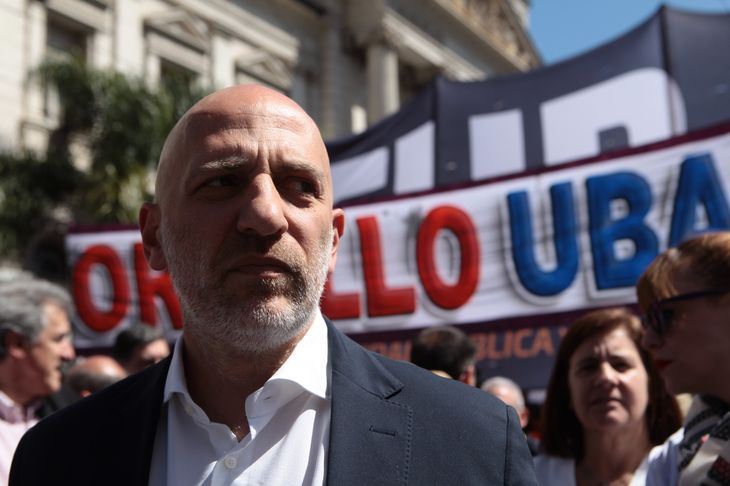After the Federal University March, the Government signed the veto of the financing law. Now, it will be the opposition legislators who will be able to insist and add two-thirds in each chamber to support the law. “That’s why the demonstration went to Congress and not to the Casa Rosada, because Milei doesn’t care,” he said. Emiliano Yacobitti, vice-rector of the UBA, in dialogue with Ámbito.
The former national representative of the UCR pointed out against the 2025 Budget, which reduces the amounts to levels “of Nicaragua or Venezuela” and fought for improvements in teacher salaries. “Professors are leaving the public university and only students who cannot afford a private university will continue to go,” he said.
Yacobitti also referred to the audits, for the purposes of the march, and mentioned that the deputies in the campaign “always spoke out in favor of public universities in particular, and public education in general.”
Journalist: How do you evaluate the federal university march on Wednesday?
Emiliano Yacobitti: What happened was very strong. Beyond the City of Buenos Aires, which was immense, there were very large mobilizations in Córdoba, Tierra del Fuego, Tucumán, Jujuy, Comodoro Rivadavia. If you add up, there was a citizen demonstration in the streets of two million people throughout the country.
Q: The government still vetoed the law, do you think Milei took note anyway?
HEY: Milei doesn’t care, the march was for the deputies. That’s why he went to Congress and not to Plaza de Mayo. From Vidal to all the radicals, those of We Make the Federal Coalition, all of them always expressed themselves in favor of public universities in particular, and public education in general. What they cannot do now is believe that supporting the veto will have no cost. Some already did it with retirees, but that is a sector that has more difficulties organizing demonstrations. With universities it is different, and all the legislators are in some province. What happened in Córdoba was shocking, because it was not only in the capital, but also in Río Cuarto, Villa María, Río Tercero.
Q: There were questions about the 2025 Budget, is there concern?
HEY: There is one fact that is alarming: in 2023 the funds for universities represented 0.78% of GDP, while the Government proposes in the 2025 Budget to lower it to 0.43%. It is the same percentage that Venezuela and Nicaragua have. Well below countries in the region such as Uruguay and Brazil, which are above 1%. It is also important to mention the salary issue. In fact, Human Capital recognized this when it proposed equalizing salaries to those of the rest of the State workers, which are already quite low. For example, today the head of the Hospital de Clínicas Service is worth $1.5 million, a top-level teacher, full-time owner, is worth $1.1 million. An assistant, $120 thousand. In the Faculty of Veterinary Medicine, 10% of the teaching staff left, about 48 professors. They also leave in Economics because they are offered 3 or 4 times more salary than in the UBA. There is no way to maintain the universities if the Government does not change this and the 2025 budget. The same happens with university colleges: teachers earned 25% more than in private schools and now 30% less. This happens, for example, at the Nacional Buenos Aires, one of the best schools in the country.
Q: What are the consequences?
HEY: The credibility of the public university begins to decline. The kids who study at the UBA because of its quality will go to a private one next year if teachers continue to leave. The students who cannot pay for a private one will remain at the UBA. And there you lose one of the most valuable things that the public university has, which is that in the classrooms of the UBA everyone comes together: the son of the millionaire businessman who goes for quality with the son of a worker, who perhaps chooses the UBA. because he can’t go anywhere else. Milei goes against that.
WhatsApp Image 2024-10-03 at 13.34.17 (1).jpeg
Q: Will the federal march have an effect on politics? What do you think the radical deputies who accompanied the Government in vetoing the retirement reform will do?
HEY: Milei is not going to back down. But they voted for the majority of the deputies for saying that they defended the public university. Even government officials. I don’t know what the radical deputies will do, it’s hard for me to imagine that they support the veto. In the provinces, Pullarlo, Schiaretti, Kicillof, Sadir, Larreta also expressed their support for the march.
Q: In the Government they say that it was a partisan march…
HEY: It was a march in which many people went to demand public universities. And it is also true that many went to complain against Milei, because there is a lot of discontent, especially in the interior. In places where Milei was better, he begins to fall. In Córdoba, for example, there were ten times more people mobilized than in April. People are not stupid: you go against retirees and university students, but at the same time the millionaires are getting better and better.
Q: The Government also says that they do not want to allow themselves to be audited, what do you think?
HEY: They are controversies that do not exist, they are false. Universities are audited like all National State organizations and also have their own collegiate bodies. The AGN audits them as it does with the Ministry of Education, Health or any part of the State. There was not a single audit rejected and the last one is from 2023 at the Faculty of Psychology.
Q: What expectations do you have now of what is going to happen in Congress?
HEY: From the universities we are talking with the legislative representatives of each province. And the expectation is that the deputies comply with what they told the people when they voted for them: that they defend the public university.
Source: Ambito
I am an author and journalist who has worked in the entertainment industry for over a decade. I currently work as a news editor at a major news website, and my focus is on covering the latest trends in entertainment. I also write occasional pieces for other outlets, and have authored two books about the entertainment industry.




